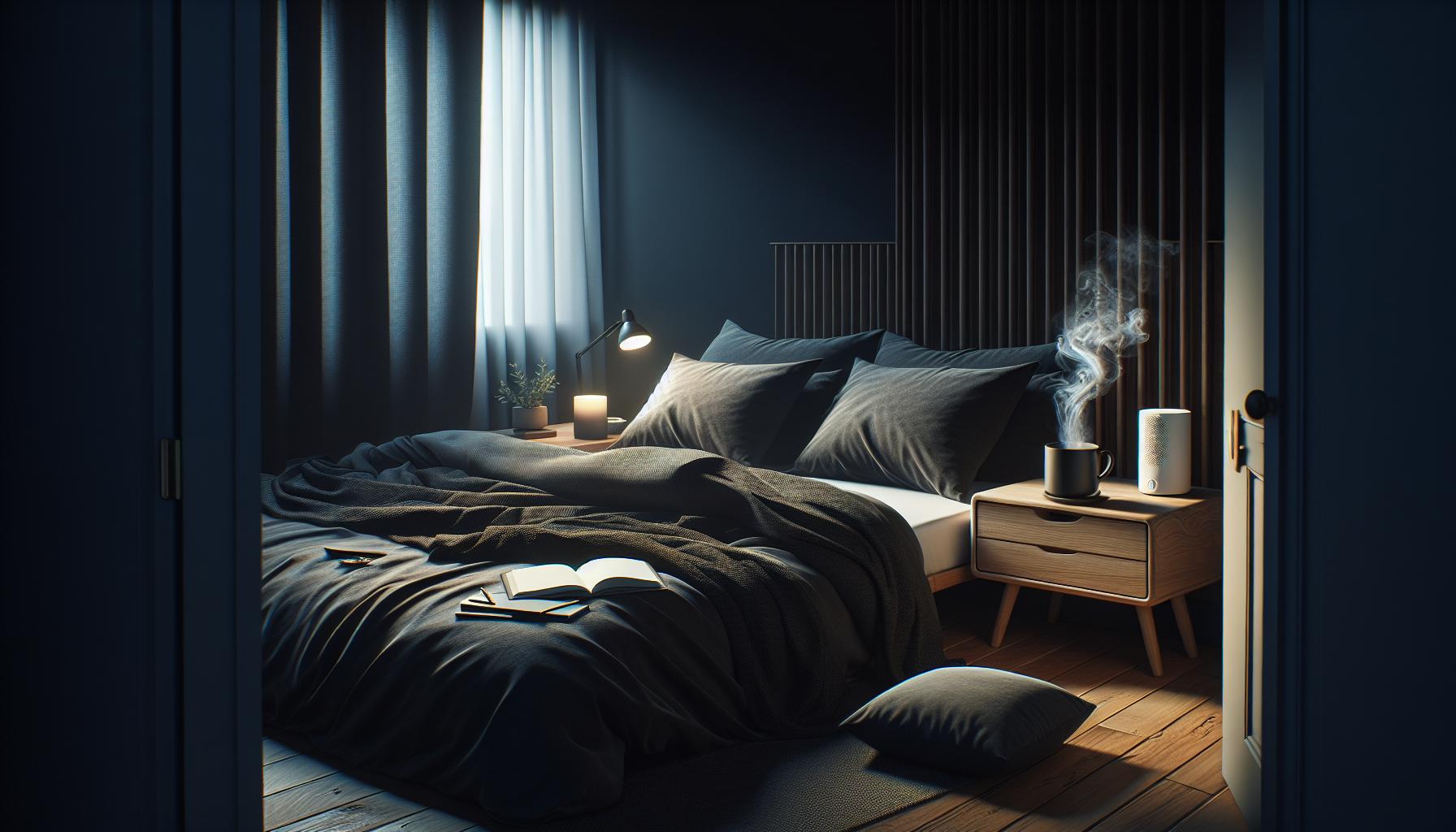Effective Strategies to Cope with Stress for Better Sleep and Less Insomnia
Imagine me curled up in my cozy nook, a cup of chamomile tea steaming gently beside me as I delve into the secrets of serene slumber. Lately, my nights have been more about tossing and turning than restful dreaming, and I suspect I’m not alone in this nocturnal struggle. So, I’ve embarked on a little journey to uncover how to soothe the day’s stress to welcome a night of peaceful sleep. It’s fascinating how our minds can buzz with endless thoughts, keeping us awake, and I’m eager to share what I discover about easing into better sleep and reducing those frustrating bouts of insomnia. Let’s explore together how simple changes can lead to the rest we’ve been dreaming of.
Understanding the Connection between Stress and Sleep
Sleep and stress are like that couple we all know who can’t live with or without each other. Unraveling this complex relationship, I dive into how stress affects our sleep and what happens when insomnia decides to crash the party.
The Impact of Stress on Sleep Quality
When stress knocks on the door, good sleep often jumps out the window. I’ve noticed stress doesn’t just make it hard to fall asleep; it also wreaks havoc on the quality of sleep. Physiologically, stress increases the levels of cortisol, a hormone linked with alertness, making our brain remain in a ‘high alert’ state when it should be winding down. Studies indicate people with high stress levels often experience reduced deep sleep phases, known as slow-wave sleep, which is vital for physical recovery and mental health. On nights when I face stress, not only do I take longer to fall asleep, but the sleep I manage to grab is often fragmented and shallow. This incomplete cycle may leave us feeling unrefreshed and lethargic the next day, creating a frustrating cycle.
How Insomnia Can Be Triggered by Stress
Let’s talk about how stress pulls the insomnia trigger. Stressful days—or even the anticipation of them—can lead our minds to race at a hundred miles an hour when we hit the bed. This mental sprint disrupts the natural progression into sleep, making restful nights a distant dream. Chronic stress keeps our body in a perpetual state of fight or flight, ready to respond to a threat. This response doesn’t just disappear at bedtime. Instead, it lingers, reducing the secretion of melatonin, the sleep hormone, making it harder to fall asleep. Over time, this persistent state can evolve into a full-blown case of insomnia, marked by difficulty falling asleep and staying asleep. This is particularly true if I’m stressed about trying to sleep, turning my bedroom into a battlefield where sleep seldom wins. Thus, managing stress becomes key not only for my sanity but also for ensuring peaceful slumber.
Practical Strategies for Coping with Stress

Reducing stress is key to unlocking the door to a peaceful night’s sleep. I’ve uncovered strategies that effectively curb stress, allowing your mind and body to relax and drift into sleep more easily.
Mindfulness and Meditation Techniques
Practicing mindfulness and meditation might sound like a wellness buzzword bingo, but trust me, it’s a game changer for your sleep schedule. Let me break it down. Engaging in mindfulness involves staying present in the moment. When you’re mindful, those nagging thoughts about tomorrow’s to-do list or that awkward email you sent last week won’t keep you tossing and turning at 2 AM.
Starting a meditation routine doesn’t have to be daunting. Just sit quietly for a few minutes each day, focusing on your breath and letting distractions come and go like waves on the shore. If your mind wanders to stressful thoughts, acknowledge them, then guide your focus back to your breathing. Apps like Headspace or Calm offer guided meditations for beginners and cater to anyone looking to find their zen before hitting the pillow.
The Role of Exercise in Stress Management
Now let’s talk about getting your sweat on—not only does exercise boost your mood by releasing endorphins, but it also helps in managing stress and improving sleep. Regular physical activity, be it yoga, jogging, or dancing in your living room, can significantly decrease anxiety and stabilize your sleep patterns.
Exercise acts like a natural sleeping pill. When you push your body during the day, it naturally craves rest to recover. Even moderate activities like a brisk 30-minute walk can have a powerful impact. But there’s a catch—timing is everything! Avoid vigorous workouts close to bedtime, as they might keep you more energized than ready for bed. Aim for morning or early afternoon to keep your nighttime routine calm and cozy.
Using these practical strategies, managing stress becomes not just a means to sleep better but a way to enhance overall well-being. So, why not give them a shot? You might find that a little mindfulness meditation and regular exercise are exactly what you need to say goodnight to stress and hello to sweet dreams.
Establishing a Sleep-Enhancing Routine

Establishing a sleep-enhancing routine isn’t just about shutting your eyes and hoping for the best—it’s about crafting a pre-sleep ritual that sets the stage for snoozing success. Let’s break down some techniques that can quiet the mind and make your bedroom a bastion of tranquility.
Bedtime Rituals to Calm the Mind
Creating a bedtime ritual is like writing a love letter to your future well-rested self. Here’s the scoop:
- Dial down the digital drama: An hour before bed, give your gadgets a goodnight kiss and put them away. The blue light from screens messes with your melatonin levels, keeping your brain on high alert like a caffeinated squirrel.
- Brew a potion of peace: A warm cup of herbal tea, such as chamomile or peppermint, works like a charm to soothe the soul and prepare your body for sleep.
- Spin some sleepy sounds: Whether it’s the calming swish of ocean waves or some slow, mellow jazz, background noises can hustle the hustle in your mind right out the door.
- Write it down, win at winding down: Spend a few minutes jotting down thoughts or sketching in a journal. It helps clear your mind of the clutter, preventing last-minute mental marathons.
The Importance of a Sleep-Conducive Environment
Think of your bedroom as a sleep sanctuary. Here’s how to make it sacred:
- Keep it cool, calm, and collected: The ideal sleeping temperature lies between 60-67 degrees Fahrenheit. This cool environment helps lower your body’s core temp, cueing it that it’s time to hit the hay.
- Invest in comfort: Splurge a bit on your sleeping gear. A good mattress and supportive pillows aren’t just luxury—they’re essentials for entering dreamland without a hitch.
- Embrace the dark side: Blackout curtains are a game changer. They block street lights or early sunbeams from rudely interrupting your sleep.
- Silence is golden: If outside noise is a nuisance, consider a white noise machine or earplugs to keep those pesky sound waves at bay.
Incorporating these strategies enhances not just the quantity but the quality of your sleep, paving the way for a fresher, more vibrant you every morning. By tuning the environment and tailoring your bedtime habits, you’re setting yourself up for a nightly reboot that’s genuinely restorative.
Advanced Approaches to Managing Stress and Insomnia

Exploring new techniques to manage stress and conquer insomnia opens up pathways to a peaceful sleep landscape. Let’s dive into some advanced strategies that might just do the trick.
Cognitive Behavioral Therapy for Insomnia (CBT-I)
Imagine reprogramming your brain to sleep better—sounds sci-fi, right? Well, Cognitive Behavioral Therapy for Insomnia (CBT-I) turns that sci-fi into reality. It’s a structured program that helps you identify and replace thoughts and behaviors that cause or worsen sleep problems with habits that promote sound sleep. Unlike popping sleeping pills, CBT-I addresses the underlying causes of insomnia.
The process typically includes practices like stimulus control (associate your bed with sleep and nothing else) and sleep restriction (limiting the time you spend in bed, creating a mild sleep deprivation). Over time, these methods increase both sleep efficiency and quality. Doctors often recommend about 5 to 8 sessions for the magic to start working. And believe me, when it kicks in, you’re not just sleeping; you’re rebooting!
When to Consider Professional Help
Sometimes, no matter how many sheep you count, sleep remains a fortress that seems impossible to breach. If you’re regularly tossing and turning or your DIY sleep solutions are flopping, it might be time to call in the cavalry—aka professional help. Recognizing this need is crucial, not just for your physical health but for your mental peace as well.
If stress and thoughts keep staging a nightly circus in your head, or if your morning self feels more zombie than human, these are signs professional help could benefit you. Sleep specialists or psychologists can offer guidance tailored to your specific issues, whether it’s using advanced therapies like CBT-I, or other interventions. Getting expert advice isn’t a surrender; it’s like consulting a personal trainer for your sleep. Remember, investing in professional help isn’t just about shutting your eyes at night—it’s about opening them in the morning feeling refreshed.
Conclusion
Tackling the stress-sleep cycle isn’t just about shutting your eyes and hoping for the best—it’s about active engagement in your mental and physical health. I’ve shared various strategies that have helped me step off the carousel of sleepless nights and into more peaceful slumber. Whether it’s through mindfulness practices, physical activities, or creating the right environment, each step is a move towards better sleep. Remember, it’s okay to reach out for professional help if your sleep issues persist. Here’s to achieving the rest you deserve and waking up refreshed and ready to take on the day!

